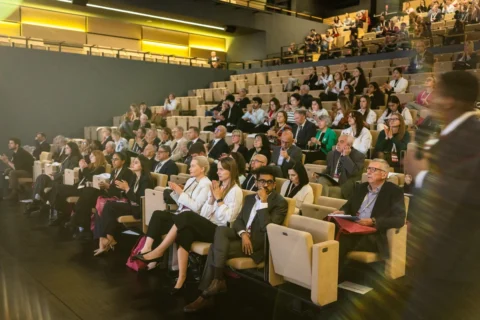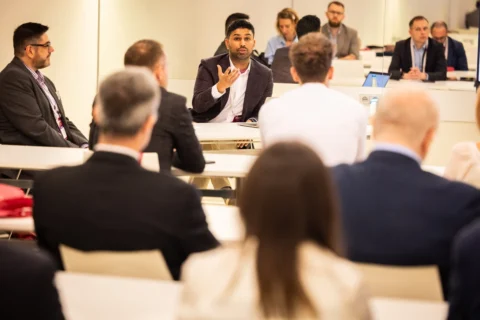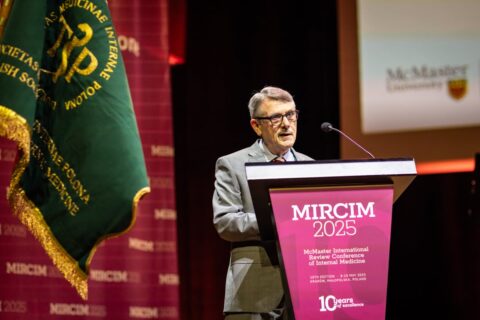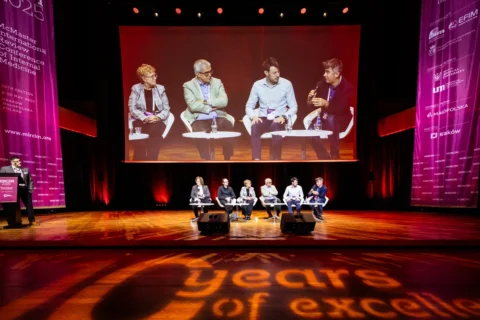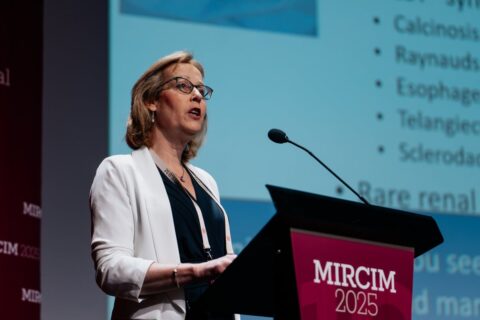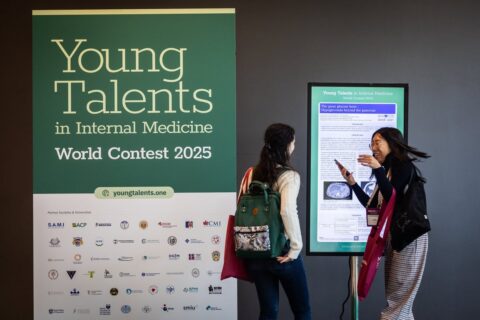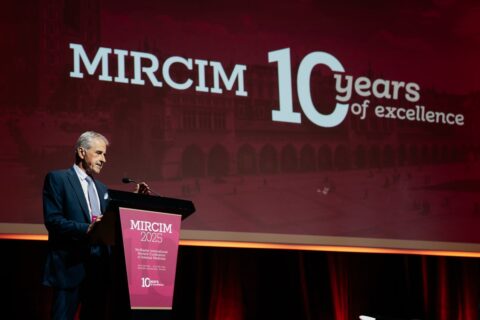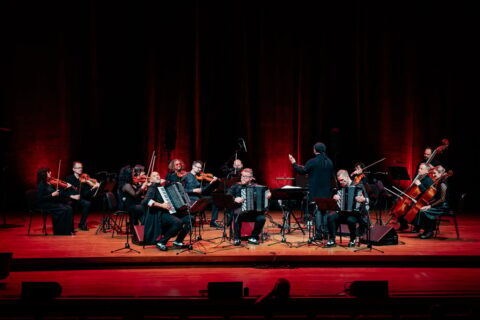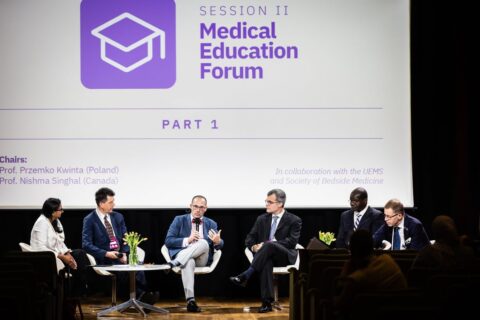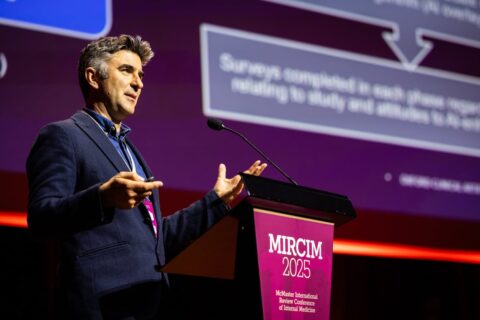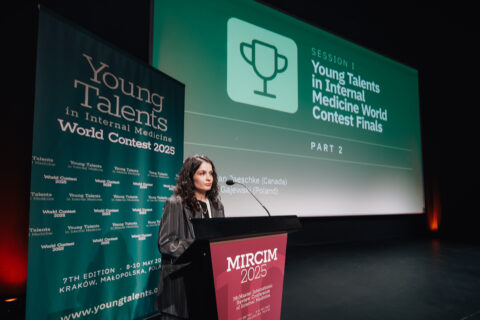
virtual delivery
The most comprehensive review conference in internal medicine
Watch online anytime, anywhere
Access over 30 hours of content covering the essential updates in internal medicine for just €250
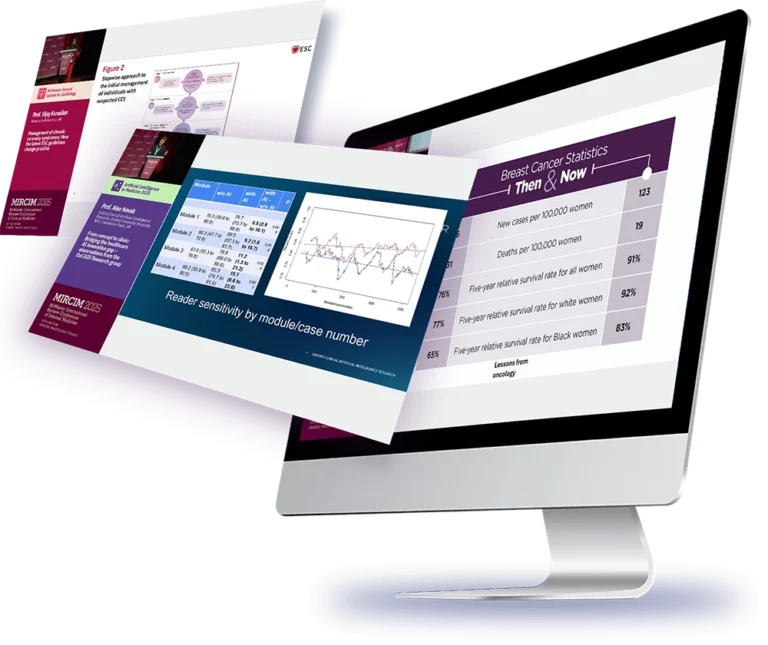

This online conference is for:
- General internists
- Subspecialists
- Hospitalists
- Family physicians
- Residents
- Fellows in training specializing in internal medicine
- Medical students
On-demand access to video recordings
Review the content at your own pace
Over 30 hours of educational content
Top-rated lectures with clear take-home messages covering the essential specialties
From Canada’s McMaster University
The home of evidence-based medicine (EBM) and one of the best medical schools in the world
Certificate of attendance
Watch the video lectures anytime and request your official certificate once you finish the course
60 world-renowned experts offering a broad perspective
Faculty from top-ranked medical universities and research centers sharing their insight and experience
Extra sessions: Medical Education Forum
Lectures and Q&As exploring the latest trends in medical education
Fascinating case reports from around the globe
20 presentations with surprising findings and clinical gems (part of the Young Talents in Internal Medicine World Contest)
120 abstracts and digital posters
Submissions from 32 countries highlighting global medical trends and challenges (part of the Young Talents in Internal Medicine World Contest)
Comprehensive conference materials
Convenient PDFs with presentations and takeaway messages
We have selected 3 excellent lectures as a sample of what you can expect:
- Prof. Janusz Jankowski, University College London, UK: GI cancer prevention: From evidence to practice
- Prof. Mark Loeb, McMaster University, Canada: Highly pathogenic avian influenza (H5N1): An update
- Prof. Serena Gundy, McMaster University, Canada: Management of nephrological and hematological complications of pregnancy
- Prof. Alejandro F. Frangi, University of Manchester, UK: Primum non nocere, secundum simulare! Ethical imperative of in silico evidence in the digital era
These are open-access lectures (no login required). Click the button to play the selected video.
What’s included
- 70 lectures spanning 11 sessions covering the essential topics and updates in internal medicine
- Unrestricted 12-month on-demand access to all video recordings from the conference
- Certificate of attendance
- Extra session: Medical Education Forum (lectures and Q&As)
- Extra session: Young Talents in Internal Medicine World Contest Finals (video presentations, abstracts, posters)
- Conference materials in PDF
Total price: €250
How to join

- Go to www.mircim.one
- Buy access by selecting “MIRCIM 2025 virtual delivery” – select your fee
- Fill in your personal information and proceed to review your virtual cart
- Confirm your order and proceed to payment
- Log in to the virtual platform and enjoy your MIRCIM virtual experience.
Great speakers, engaging, relevant topics.
It helps me to provide new methods of diagnosis and new recommendations for treatment of my patients.
The best part of this event was the fact that I can be part of this incredible experience where knowledge is shared by the most elite professors around the world and get the updates concerning the internal medicine guidelines as well as the latest research.
The possibility to discover new developments in internal medicine and to discuss it with world-class experts, clear and valuable presentations that provide data important in practice, explain recent meta-analysis.
After this event I’ve realized that as a medical doctor, we should be able to think outside of the box to give our patient the best treatment plan.
The McMaster International Review Conference in Internal Medicine (MIRCIM) is held annually since 2015 in Kraków, Poland, and in recent years also online. Developed by the McMaster University’s Department of Medicine and the Polish Institute for Evidence Based Medicine (PIEBM), it is organized in collaboration with the European Federation of Internal Medicine (EFIM), International Society of Internal Medicine (ISIM), and Jagiellonian University Medical College in partnership with more than 40 national societies of internal medicine from around the world, including the American College of Physicians (ACP).
The 3‑day conference is filled with 70 information‑packed lectures. Our speakers are world‑renowned experts in their fields, including authors of clinical practice guidelines and researchers behind breakthrough trials that shape the modern standards in medicine.
Agenda
All the presentations listed below are part of the online access bundle. You will also receive a link to downloadable content.
All lectures are in English.
Keynote lecture
Evidence-based medicine: Past, present, future
Prof. Gordon Guyatt (McMaster University, Canada)
Opening lectures
To do or not to do? Clinical practices we do for no reason
Prof. Isaac Opole (President, American College of Physicians, USA)
The second victim phenomenon and its impact on health care
systems, patients, and those who care
Prof. José Joaquín Mira (Miguel Hernández University of Elche, Spain)
Session I: Young Talents in Internal Medicine World Contest Finals
Chairs: Prof. Roman Jaeschke (Canada), Prof. Piotr Gajewski (Poland)
A 57-year-old welder with altered liver biochemistry and Kaposi’s sarcoma: A rare case with a unifying hypothesis
Dr. Mattia Lotto, Italy
Pulmonary edema - not just a cardiological diagnosis
Dr. Anna Ürgeová, Slovakia
When the body rebels
Dr. Klára Dombrovská, Czechia
Kidney disease… Is it worth the weight?
Dr. Peter Todd, Scotland
Aseptic abscess syndrome: Unravelling a rare cause of fever and abscesses in inflammatory bowel disease
Dr. Joana Nunes, Portugal
The vessel of warning: A case of unexplained recurrent arterial thrombosis
Dr. Yin Nan Huang, Canada
Recurrent VTE in a patient with multiple spontaneous intracerebral haemorrhages on a background of CAA
Dr. Aoife Harrison, Ireland
First documented use of the Wrapsody stentgraft for the treatment of nutcracker type of pelvic congestion syndrome
Dr. Elene Tkabladze, Germany
Now you see me: Bazin’s disease
Dr. Virginia Huhn, Argentina
Peritoneal implantation of pheochromocytoma – pheochromocytomatosis
Dr. Erik Bényei, Hungary
Human herpes virus-8 and AIDS: Old friends and a new foe
Dr. Daniel-Nicolás Marco Prats, Spain
The typhoid malady: A wolf in the skin of a lamb
Dr. Shashank Ravi Ganesh, India
Pyrexia puzzle – take a closer look to solve the mystery: A case report
Dr. Radwa Genidy, United Arab Emirates
Navigating the complexities: Case study of neuroinfection accompanied by thrombocytopenia
Dr. Aleksandra Raczyńska, Poland
Blood, brain, and a hidden battle: A case of eosinophilia and chronic strokes
Dr. Mehala Subramaniapillai, Canada
Refractory ascites and multinodular systemic involvement revealing an exceptional multivisceral form of vascular epithelioid tumor associated with the EWSR1::NFATC2 rearrangement
Dr. Arthur Renaud, France
From gut to gene: How colitis led to the diagnosis of a rare immunodeficiency
Dr. Leslie Naesens, Belgium
When family history illuminates the path: An uncommon cause of esophageal stricture
Dr. Mariana Pereira, Chile
Neuropathy in a diabetic patient. Think again.
Dr. Brian Beyers, South Africa
Misdiagnosis risk in tuberculosis-endemic regions: A multidisciplinary case report
Dr. Yüsra Ağaoğlu, Turkey
Session II: Medical Education Forum 2025
Part 1
In collaboration with the UEMS and Society of Bedside Medicine
Chairs: Prof. Przemko Kwinta (Poland), Prof. Nishma Singhal (Canada)
Reinvigorating the bedside exam: Strategies to improve the teaching and assessment of bedside clinical skills
Prof. Brian T. Garibaldi (Center for Bedside Medicine, Northwestern University Feinberg School of Medicine, USA)
How to effectively teach at the bedside during rounds
Dr. Timothy Niessen (Johns Hopkins University School of Medicine, USA)
From traditional into digital lectures: Risks and benefits
Prof. Przemko Kwinta (Jagiellonian University Medical College, Poland)
European CME/CPD and the European Union of Medical Specialists (UEMS)
Prof. Hannu Halila (University of Helsinki, Finland)
Medical education program reconstruction for an active learning, competency-based, excellence-driven (ACE) curriculum
Prof. Isaac Opole (American College of Physicians, USA)
Questions & Answers
Part 2: From the battlefield to the bedside: Practical lessons to enhance medical education
Session under the honorary patronage of the Ministry of National Defense, Republic of Poland
Chairs: LtCol Dr. Anita Podlasin (Poland), Prof. Michael Czekajlo (USA)
Individual and team training programs in the military that lead to high-performing clinicians and teams
Prof. Anthony LaPorta (Rocky Vista University, USA)
Challenges in medical education for future armed conflict: Standardized training in non standardized environment
Lt. Col. Dr. Anita Podlasin (Military Medical Training Center in Lodz, Poland)
Adapting the military experience into civilian training: Case studies and a vision for the future
Prof. Michael Czekajlo (Virginia Commonwealth University Health, USA)
Prepare the best for the worst: Implementing battlefield experience into the medical school curriculum
Dr. Tomasz Sanak (Jagiellonian University Medical College, Poland)
Implementation of cross training in military medical personnel education
2nd Lt. Artur Skobel (Postgraduate Education Center, Military Institute of Medicine – National Research Institute, Poland)
Questions & Answers
Session III: Artificial Intelligence in Medicine 2025
Part 1: From data to bedside: Using big data to develop AI tools for medicine
Chairs: Prof. Bartłomiej W. Papież (UK), Prof. Dan Perri (Canada)
Introduction
Prof. Bartłomiej W. Papież (Big Data Institute, University of Oxford, UK)
Will the European Health Data Space (EHDS) contribute to the AI revolution?
Dr. Andrzej Ryś (former Director for Health Systems, Medical Products and Innovation, DG SANTE, European Commission, Belgium; EHDS Co-creator)
Clinical AI: Curiosity, or cure?
Dr. Mikael Brudfors (Senior Solution Architect, NVIDIA, UK)
AI to reduce bureaucracy in medicine
Tomasz Kopacz (Healthcare Technology Strategist at Microsoft, Poland)
AI in cardiothoracic imaging: Ready for clinical implementation?
Prof. Rozemarijn Vliegenthart (University Medical Center Groningen, the Netherlands)
Pig in a poke? Unpacking the promise and pitfalls of foundation models in health care
Prof. Bartłomiej W. Papież (Big Data Institute, University of Oxford, UK)
From concept to clinic: Bridging the healthcare AI innovation gap – observations from the OxCAIR Research group
Prof. Alex Novak (Oxford Clinical Artificial Intelligence Research, Oxford University Hospitals NHS Foundation Trust, UK)
Questions & Answers
Part 2: Humans and AI view on healthcare: For users of AI tools
Chairs: Prof. Bartłomiej W. Papież (UK), Prof. Dan Perri (Canada)
Regulatory ecosystem for the AI-enabled medical devices: A brief summary for clinicians
Prof. Piotr Szymański (Chairman, Regulatory Affairs Committee of the European Society of Cardiology, National Medical Institute of the Ministry of the Interior and Administration, Poland)
Primum non nocere, secundum simulare! The ethical imperative of in silico evidence in the digital era
Prof. Alejandro F. Frangi (University of Manchester, UK)
Friend or foe? Navigating human-AI interactions in clinical practice
Prof. Bartłomiej W. Papież (Big Data Institute, Oxford University, UK)
Front-line experience in evaluating and translating AI tools into hospitals
Prof. Alex Novak (Oxford Clinical Artificial Intelligence Research, Oxford University Hospitals NHS Foundation Trust, UK)
Challenges with integrating AI into clinical workflows
Prof. Dan Perri (McMaster University, Canada)
Integration of AI in medical education
Prof. Sameer Shaikh (McMaster University, Canada)
Questions & Answers
Session IV: McMaster Annual Update in Cardiology 2025
In collaboration with the Polish Cardiac Society
Part 1
Chairs: Prof. Robert Gil (Poland), Prof. Jacek Legutko (Poland)
Management of chronic coronary syndromes: How the latest ESC guidelines change practice
Prof. Vijay Kunadian (Newcastle University, UK)
Current invasive approach to acute coronary syndromes
Prof. Sanjit Jolly (McMaster University, Canada)
Perioperative cardiovascular management of patients undergoing noncardiac surgery
Prof. P.J. Devereaux (McMaster University, Canada)
Chronic heart failure: 2025 update
Prof. Piotr Ponikowski (Wroclaw Medical University, Poland)
Questions & Answers
Part 2
Chairs: Prof. Akbar Panju (Canada), Prof. Piotr Ponikowski (Poland)
Non-invasive management of peripheral arterial and aortic diseases: An overview of ESC guidelines
Prof. Victor Aboyans (University of Limoges, France)
Current invasive modalities in the management of peripheral arterial and aortic diseases
Prof. Raphaël Coscas (University of Versailles Saint-Quentin-en-Yvelines, France)
Venous thromboembolism: 2025 update
Prof. James Douketis (McMaster University, Canada)
Cardio-kidney-metabolic (CKM) syndrome: Risk factors and management principles
Prof. Grzegorz Gajos (Jagiellonian University Medical College, Poland)
Questions & Answers
Part 3
Chairs: Prof. Roman Jaeschke (Canada), Prof. Grzegorz Gajos (Poland)
Management of atrial fibrillation: Current strategies according to the latest ESC practice guidelines
Prof. Ruben Casado Arroyo (Université libre de Bruxelles, Belgium)
Anticoagulation in patients with atrial fibrillation
Prof. Dimitri Richter (Athens Euroclinic Hospital, Greece)
Electrotherapy in cardiac arrhythmias: 2025 update for everyday clinical practice
Prof. Josef Kautzner (Palacký University Medical School, Czechia)
Update on cardiopulmonary resuscitation 2025
Prof. Bernd W. Böttiger (University of Cologne, Germany)
Questions & Answers
Session V: Pulmonology
Chairs: Prof. Roman Jaeschke (Canada), Prof. Brian T. Garibaldi (USA)
Pulmonary physiology: What clinicians (still) need to know
Prof. John Kolbe (University of Auckland, New Zealand)
Asthma management: GINA 2025 update
Prof. Arzu Yorgancıoğlu (Manisa Celal Bayar University, Turkey)
Incidental findings from low dose CT screening for lung cancer: When to worry
Prof. Julian Dobranowski (McMaster University, Canada)
How to predict and prevent perioperative pulmonary complications: The role of a consultant and prehabilitation team
Introductory speaker: Prof. Dorota Sobczyk, John Paul II Specialist Hospital in Kraków, Poland
Main speaker: Prof. Tarannum Rampal, King’s College Hospital NHS Foundation Trust, UK
Questions & Answers
Session VI: McMaster Annual Update in Rheumatology 2025
Part 1
Chairs: Prof. Bhaskar Dasgupta (UK), Prof. Piotr Wiland (Poland)
Disease stratification, personalised medicine and treatment advances in rheumatology: Parallels with other conditions
Prof. Bhaskar Dasgupta (Anglia Ruskin University, UK)
Rheumatoid arthritis stratified management
Prof. Ernest Choy (Cardiff University School of Medicine, UK)
Systemic lupus erythematosus stratified management
Prof. Frédéric Houssiau (UCLouvain, Belgium)
ANCA vasculitis stratified management
Prof. Christian Pagnoux (University of Toronto, Canada)
Questions & Answers
Part 2
Chairs: Prof. Bhaskar Dasgupta (UK), Prof. Mariusz Korkosz (Poland)
Systemic sclerosis stratified management
Prof. Maggie Larché (University of Calgary, Canada)
Axial spondyloarthritis stratified management
Prof. Elena Nikiphorou (King’s College London, UK)
Psoriatic arthritis stratified management
Prof. Laura Coates (University of Oxford, UK)
CPPD deposition and other crystal arthropathies stratified management
Prof. Geraldine McCarthy (University College Dublin, Ireland)
Questions & Answers
Part 3
Chairs: Prof. Bhaskar Dasgupta (UK), Prof. Mariusz Korkosz (Poland)
Still’s disease stratified management
Prof. Lorenzo Dagna (Vita-Salute San Raffaele University, Italy)
Polymyalgia and giant cell arteritis stratified management
Prof. Bhaskar Dasgupta (Anglia Ruskin University, UK)
Fibromyalgia stratified management
Prof. Jacob Ablin (Tel Aviv University Faculty of Medical and Health Sciences, Israel)
Questions & Answers
Session VII: Gastroenterology
Chairs: Prof. Akbar Panju (Canada), Prof. Aftab Moshin (Pakistan)
Diverticular disease of the colon: Current management
Prof. Paul Moayyedi (McMaster University, Canada)
Irritable bowel syndrome: How to adjust treatment depending on symptoms and co-morbid conditions
Prof. Jan Tack (KU Leuven, Belgium)
GI cancer prevention: From evidence to practice
Prof. Janusz Jankowski (University College London, UK)
Metabolic dysfunction–associated steatotic liver disease (MASLD): Current management according the EASL-EASD-EASO 2024 guidelines
Prof. Hannele Yki-Järvinen (University of Helsinki, Finland)
Questions & Answers
Session VIII: Infectious Diseases
Chairs: Prof. Nishma Singhal (Canada), Prof. Monika Bociąga-Jasik (Poland)
Dengue and other vector-borne febrile infections: Differential diagnosis pitfalls
Prof. Somia Iqtadar (King Edward Medical University, Pakistan)
Highly pathogenic avian influenza (H5N1): An update
Prof. Mark Loeb (McMaster University, Canada)
Acute diagnosis and management of pneumonia
Prof. Brian T. Garibaldi (Center for Bedside Medicine, Northwestern University Feinberg School of Medicine, USA)
Management of bloodstream infections
Prof. Nishma Singhal (McMaster University, Canada)
Questions & Answers
Session IX: Nephrology and Hematology
Chairs: Prof. Virginia Hood (USA), Prof. Justyna Rybka (Poland)
Nephrology update 2025: Advances relevant to everyday clinical practice
Prof. Jürgen Floege (RWTH Aachen University, Germany)
Management of nephrological and hematological complications of pregnancy
Prof. Serena Gundy (McMaster University, Canada)
Cancer-associated thrombosis: Current management
Prof. James Douketis (McMaster University, Canada)
Questions & Answers
Session X: The Multimorbid Patient
Under the auspices of the European Federation of Internal Medicine
Chairs: Prof. Akbar Panju (Canada), Prof. Julija Voicehovska (Latvia)
A multimorbid patient before invasive treatment: The interdisciplinary preparation including prehabilitation
Introductory speaker: Dr. Magdalena Łasińska-Kowara, COPERNICUS Regional Oncology Center in Gdańsk, Poland
Main speaker: Prof. Amy H. Ng, The University of Texas at MD Anderson Cancer Center, USA
Identification and management of osteosarcopenia
Prof. Julija Voicehovska (Rīga Stradiņš University, Latvia)
Managing complex multimorbidity cases: Lessons from personal experience
Prof. Rebecca W. Opole (University of Kansas School of Medicine, USA)
Questions & Answers
Session XI: McMaster Annual Update in Diabetology & Endocrinology 2025
Under the auspices of the European Association for the Study of Diabetes
In collaboration with Diabetes Poland
Part 1
Chairs: Prof. Tina Vilsbøll (Denmark), Prof. Marie Pigeyre (Canada)
Diabetes treatment algorithm of the joint ADA and EASD guidelines: 2025 update
Prof. Melanie Davies (University of Leicester, UK)
Precision medicine in diabetes management
Prof. Marie Pigeyre (McMaster University, Canada)
GLP-1 receptor agonists in type 2 diabetes mellitus and other diseases: A summary of study results and practical tips for the physician
Prof. Tina Vilsbøll (University of Copenhagen, Denmark)
Modern treatment of obesity: How incretin-based therapies have changed the options for effective treatment
Prof. Martin Haluzík (Charles University, Czechia)
Questions & Answers
Part 2
Chairs: Prof. Tina Vilsbøll (Denmark), Prof. Ally Prebtani (Canada)
Glucose and HbA1c tests: From diagnosing diabetes to modern diabetes monitoring
Prof. Leszek Czupryniak (Medical University of Warsaw, Poland)
How to diagnose thyroid diseases wisely and avoid unnecessary tests
Prof. Ally Prebtani (McMaster University, Canada)
Male hypogonadism: When to suspect, how to diagnose and treat?
Prof. Nadia Sawicka-Gutaj (Poznan University of Medical Sciences, Poland)
Questions & Answers
The only international review conference in internal medicine from McMaster University, the home of evidence-based medicine (EBM) and one of the best medical schools in the world.
World class speakers and trainers
Our lineup of speakers includes world-renowned experts in their fields, authors of clinical practice guidelines, and researchers behind breakthrough trials that shape the modern standards in medicine. Coming from different universities and research centers, they are uniquely qualified to trace, explain, and address the emerging trends in medicine around the world, combining local experience with international standards.
Organized by




in cooperation with
Access 70+ lectures spanning 11 sessions and over 30 hours of content covering the essential topics and updates in internal medicine
Frequently asked questions
Who is this conference intended for?
The course is directed to general internists, subspecialists, hospitalists, family physicians, residents, fellows in training specializing in internal medicine, and medical students.
Can I join this conference as a student?
Yes. This course is addressed to both physicians and students.
Will I receive a certificate after the conference?
Yes. First we will ask you to complete an evaluation and feedback form on the virtual platform. Then, you will receive automatically generated PDF certificate with the number of CME credits obtained. You can claim up to 20.5 CME credits for the complete conference. CME credits are available through November 10, 2025.
Do I need to register an account to sign up for the conference?
Yes. You need to register an account to place and finalize your order via the virtual platform.
I have a problem with registration and/or payment, who can help me?
In case of any problems with registration and/or payment, please contact Marta Pasiut at registration@piebm.org.
Will I receive an invoice?
Yes. The invoice will be sent to your email address once we have received and processed your payment. It may take up to 7 working days.
Do I need to be present live to receive CME credits?
No, live attendance is NOT required to receive CME credits. You can watch the video recordings from the conference at your own pace during the 6-month period following the event and still claim your CME credits in the same way as the participants of the live event.
Can I convert/transfer my CME credits?
Yes. Through an agreement between the European Union of Medical Specialists and the American Medical Association, physicians may convert EACCME® credits to an equivalent number of AMA PRA Category 1 Credits™. Information on the process to convert EACCME® credit to AMA credit can be found at https://edhub.ama-assn.org/pages/applications.
Live educational activities, occurring outside of Canada, recognized by the UEMS-EACCME® for ECMEC®s are deemed to be Accredited Group Learning Activities (Section 1) as defined by the Maintenance of Certification Program of the Royal College of Physicians and Surgeons of Canada.
Credit will be converted based on one (1) hour of participation equaling one credit for all activities. Physicians wishing to
convert EACCME® credits to AMA PRA Category 1 Credit™ will be required to access the AMA website at https://edhub.ama-assn.org/pages/applications to obtain the necessary paperwork and instructions. Physicians and other health care professionals will be required to pay a processing fee to the AMA.
For other countries, please contact the relevant national/regional accreditation authority.
How can I log in to the virtual platform?
You can log in to the virtual platform with the same login credentials that you used to place and finalize your order in Payments system.
I am not sure what my login credentials are, how can I check them?
Your login (username) is your email address provided to create your user account. At that point, you have also set your password to finalize your order in Payments system.
If you don’t remember the email address you provided, please check your inbox for a message with a verification link to activate your account.
You can always contact registration@piebm.org to request this information.
I don’t remember my password, can I recover it?
If you don’t remember your password, you can reset it yourself here: Reset my password.
In case of any problems, please contact bok@ppv-stream.pl.
How long will I have online access to the conference?
You will receive one-year on-demand access to the virtual conference. In the first 6 months, from May 11 till November 10, 2025, you can earn and claim your CME credits for watching the video recordings. After November 11, 2025, you can still watch the videos but no longer receive the CME credits.
What is Young Talents in Internal Medicine World Contest?
Young Talents in Internal Medicine World Contest is a contest where junior internists and trainees in internal medicine from around the world educate one another using examples from their own practice.
It is addressed to internal medicine specialists or trainees in internal medicine up to 35 years of age representing national societies of internal medicine or universities who are the official partners of the McMaster International Review Conference of Internal Medicine (MIRCIM).
The 20 top-ranked case reports from around the world are presented by the authors and discussed by world-renowned experts during the session Young Talents in Internal Medicine World Contest Finals.
The other case reports, which are not qualified for oral presentations, are presented by the authors at poster sessions to the on-site audience and experts, and in a digital form (abstracts and e-posters) to the virtual audience.
If you need any further assistance...

...talk directly to Marta, our Conference Manager!
Marta Pasiut
registration@piebm.org
+ 48 663 430 239 (mobile and WhatsApp)
Working hours
Mon 12-18 | Tue 9-17 | Wed 12-18 | Thu 9-17 | Fri 9-17
Central European Summer Time / UTC+2
Polish Institute for Evidence Based Medicine
Gazowa 14A | 31-060 Kraków, Poland
contact@piebm.org | www.piebm.org
